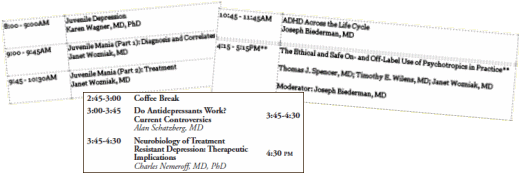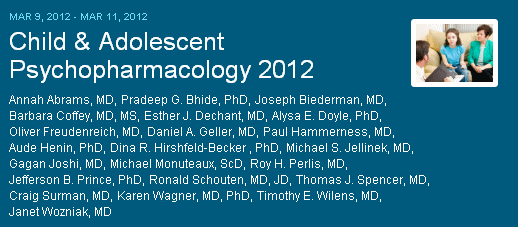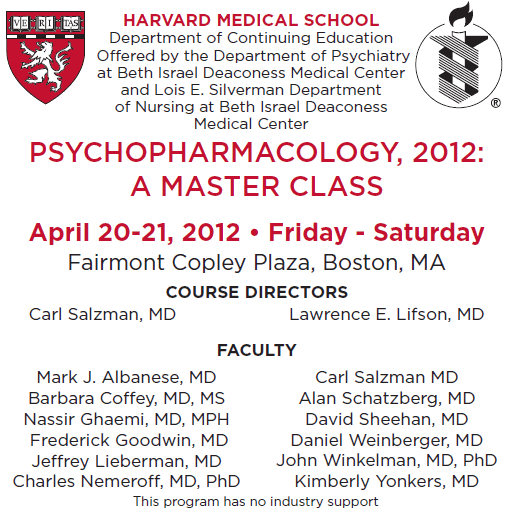
While it’s tempting to be sarcastic about these two winter CME programs coming from the hallowed halls of ivy, there’s nothing humorous about this story. Over half of Senator Grassley’s list of payola non-reporters, several from Paul Thacker’s POGO expose of ghost-writing, the alumni from the Pediatric Bipolar debacle, three recently censured by Harvard itself, and several with a rap sheets too long to even list [they may as well have added the people from TMAP/CMAP to round out their programs]. Forgoing sarcasm, how about irony: Alan Schlatzberg posing the question "Do antidepressants work?" followed by Charles Nemeroff discussing the neurobiology of when they don’t?; Joseph Biederman moderating a panel on ethics?; Karen Wagner [of Paxil Study 329] on Juvenile Depression and Janet Wozniak [Ms. Bioplar Child] on Juvenile Mania.
On the face of things, this seems like the theater of the absurd – a skit from Saturday Night Live, The Onion, or The Daily Show with Jon Stewart. But it’s not. It’s a testimony to inertia – the inertia of PHARMA’s investment in Psychiatry, the inertia of the power base in Psychiatry, the inertia of psychiatrists accepting their delegated plight as medication managers – an inertia created by money. "This program has no industry support" matters little in that it is followed on the flyer by, "Register early, this course SOLD OUT 5 weeks before the course began last year!!" And one wonders how many of the people in the audience paying to be there know the story behind the faculties of these CME presentations?



Thank you for writing this!
It really is a joke: no industry support! not that the Harvard 3 forgot to report (forgot…) MILLIONS of dollars to the point where Sen Charles Grassley busted them, or not that Harvard had reason to sanction them or anything! I guess they figured the mea culpa letter printed in the Harvard Crimson would suffice to clear their names!
OH but when ‘GOD’ teaches CME everyone listens! LOL
Oh, what a tangled web HaHaHarvard weaves:
Harvard Medical School (HMS) – Dean Jeffrey Flier (link to his cv)
HMS Dean’s wife Maratos-Flier
HMS Centers, Divisions & Institutes These include the Catalyst – facilitating interdisc. research, faster to clinical practice, translational research, medical ethics and mental health and media – controlling the public messaging
Harvard Catalyst search on “Psychiatry”
HMS Dept of Psychiatry
Harvard Research Trials
Harvard affiliated hospitals
Flagship Harvard affiliated hospitals (Partners.org) – Massachusetts General Hospital (MGH) & Brigham and Women’s Hospital (BWH, also referred to as The Brigham – shares the HMS physical campus) and all of the Partners entities in its web
President and CEO of Partners.org Leadership Gary Gottlieb, MD, board certified psychiatrist
Gary Gottlieb’s wife, Derri Shtasel, board certified psychiatrist, Director of Community Psychiatry, Massachusetts General Hospital (MGH)
Psychiatry Department at HMS
Psychiatry Department at MGH
Psychiatry Academy at MGH (for profit entity) Anyone can join – it’s free and EZ peasy, if stomach churning queasy.
Research overview and Clinical Research Organization at MGH (for profit entity) The staff’s and consultants’ names will be familiar.
The Partners human subject research recruitment tool, RSVP for Health
Harvard just announced a new university reporting policy. But that only applies to university-based research. Partners entities don’t fall under that. So profs at HMS who transgress but whose research is routed through MGH or BWH get what? a 1 year time-out from participating in the transgression and then away they’ll go again?
I’m sorry this link fest is so long. I keep hoping that a non-Boston, non-Harvard investigative reporter will dig into the many COIs built into this matrix of orgs, replationships, funding and reporting mechanisms. I didn’t even cross the Longfellow bridge and walk from MGH over to MIT where there are blocks of Institutes for cognitive, brain, mind and psychiatric research like the Koch (yes, THAT Koch), the Broad, the Whitehead, etc. Those all have Partners/Harvard/MIT/Tufts physicians, scientists and researchers all playing in the same sandboxes.
And McCLean – where does that fit into this mess’o’psychomania?
Bottom line – how does anyone find and receive non-pharma marketing contaminated psychiatric/mental health care in Boston, let alone in all of the areas their tentacles reach?
Oh, there’s no preview – keeping my fingers crossed that all of these links work….
My last link fest comment about the tangled web of Harvard, Partners and Mass General may be circulating in the spam file. But I dug up one more that may be of interest:
The RVL
Research Ventures & Licensing (RVL) is a division of Partners HealthCare that coordinates industrial relationships and IP management across Partners HealthCare, Massachusetts General Hospital and Brigham and Women’s Hospital.
RVL is a cohesive, coordinated group servicing medical inventors, thought-leaders, entrepreneurs and industry. Our goal is to take medical inventions and innovations discovered by Partners HealthCare researchers and provide the appropriate support and infrastructure to allow technology development, commercialization and, ultimately, the development of products to benefit patients.
“Register early, this course SOLD OUT 5 weeks before the course began last year!!”
This reminds me of the star-studded “Medications in Bipolar Disorder” seminar at the 2011 APA conference. Standing-room only. Arguments over the last available seats. People had to be ushered out because of the potential fire hazard. The lectures were simply slide after slide of medications and their clinical trial data, but the audience ate it up like you wouldn’t believe.
“…one wonders how many of the people in the audience paying to be there know the story behind the faculties of these CME presentations?”
As I commented on one of your recent posts, I’m sure very few know, and even fewer care.
(Just an anecdote: a resident in my hospital presented a Biederman paper during a recent Journal Club. She did a fair job. Afterward, when I discussed with the group Biederman’s checkered past and whether that would affect their interpretation of the article, many of the residents responded very defensively, as if I was making a personal attack– partly on them, partly on her field– or nitpicking unnecessarily, when in fact all I was doing was asking my peers to be more skeptical of what they read. But we’d rather hide our heads in the sand, apparently.)
unbelievable.
duane
@SteveB:
Your experience with the residents leaves me terribly saddened, but it’s congruent with my own experiences.
The NHS, I believe, is concerned about patients suing prescribing physicians when adverse effects occur, and the rationale for prescribing the drug was based on contaminated data. Have your residents considered that they may be held liable?
And isn’t their reaction a form of dereliction of duty? Where’s Rob Lindeman to offer his usual, “primum non nocere”? I don’t get the sense that most practicing psychiatrists view patients as anything OTHER than a collection of symptoms which are medicated to suppress them so that they no longer disturb the psychiatrist.
By any chance is anyone familair with Hildegard Peplau‘s work? It would be worthwhile to revisit it, methinks. I’m a bit biased, having taken my graduate work at Teachers College with some Rogerian counseling classes along with nursing administration, my concentration, and health education for adult learners. But I think the majority of her work still holds critical relevance.
Let’s face it: Harvard has a high tolerance for academic corruption. Think Hauser!
BTW did you see the NY Times OP-Ed piece by Dr. Sroufe on ADHD meds (January 28, 2012) entitled “Ritalin Gone Wrong”? Check it out. It’s a hoot.
I’d like to see the list of people who pay to take these seminars.
I’d like to see the list of people who pay to take these seminars.
If not the same people, then cut from the same cloth as those who fork over their hard-earned money to hear a charlatan tell them how they, too, can make a fortune in real estate.